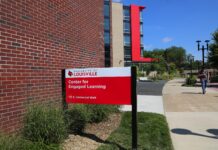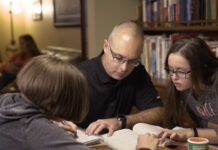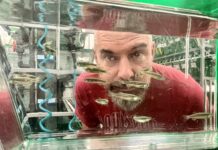LOUISVILLE, Ky. – In her continuing effort to fight the disease she believes took her mother’s eyesight, retired anesthesiologist and graduate of the University of Louisville School of Medicine Geneva Matlock, MD, has given another $4 million to UofL to fund research in macular degeneration. This gift brings Dr. Matlock’s total contributions to UofL to more than $5 million in the past three years.
“Dr. Matlock’s extraordinarily generous support of our research in macular degeneration speaks to the compassionate and selfless person she is, both as a physician and as a human being,” said Henry Kaplan, MD, Evans Professor and Chair of the Department of Ophthalmology & Visual Sciences at UofL, which will receive the monies. “We continue to be humbled and incredibly grateful for the confidence she has shown in us.”
Matlock, who resides in San Clemente, Calif., was diagnosed with wet macular degeneration 10 years ago and through treatment she has retained her vision and is still able to drive. Matlock’s mother, who died at the age of 99, was blind for the last 10 years of her life and though she was never officially diagnosed, the family believes she may have suffered from the disease as well.
“I’m focusing on the eye because of my personal experience,” Matlock said. “I’m hoping that no one else will go blind as my mother did or as I probably would have if I were not getting the care I am now.”
“Geneva Matlock is a perfect example of the University of Louisville family,” said Dr. James R. Ramsey, UofL president. “Our graduates make their mark in the world. Then give back to their university and communities. This unselfishness means opportunities for others and a chance to avoid some of the terrible diseases that UofL is fighting every day.”
Macular degeneration can start slowly, and many people do not notice any symptoms at first. Over time, as the retina degenerates, patients can begin to experience a loss of the sharp, central vision that allows them to see objects clearly. Macular degeneration is the leading cause of vision loss in people age 55 and over. There are two forms of macular degeneration. Wet macular degeneration occurs when abnormal blood vessels begin to grow beneath the retina and leak blood and fluid, quickly causing damage to the central retina. Dry macular degeneration occurs when the light-sensitive cells in the retina slowly break down, gradually blurring vision and also eventually leading to the loss of central vision. It is estimated that 10 million Americans suffer from macular degeneration, according to the American Macular Degeneration Foundation.
The University of Louisville Department of Ophthalmology & Visual Sciences has several active research studies examining various aspects of macular degeneration from the basic causes of the disease to the clinical treatment of patients with new medicines, as well as stem cells, Kaplan said.
“The advances in the treatment of macular degeneration are possible because of what has been learned through research and it is my goal to keep that research going, so we can discover more about what causes this disease, how to prevent it and how to most effectively treat and even cure it in the future,” Matlock said.




























